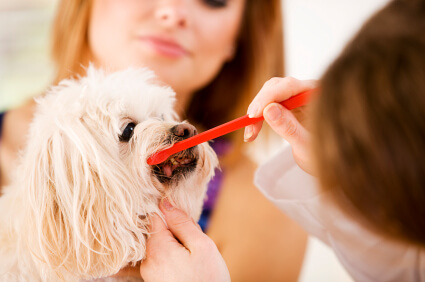Friendly advice
While veterinarians must conform to established educational degrees and licensing standards, you’ll find as many personalities and philosophies among vets as you will among people in any field. That’s why a good place to start is with a recommendation from a friend and fellow pet-parent whose opinions you trust.
Local breeders or animal shelters can also be a good source for vet referrals, as can trainers and groomers. If you’re new to an area, you can check the yellow pages or search online.
But getting a name is just the beginning. Make an appointment to meet the doctor, and prepare to use your powers of observation and judgment, following these guidelines.
Examining the vet
When you visit the vet's practice, be observant. Things to look for include:
- A clean facility
- A comfortable waiting room
- A pleasant and helpful receptionist
- A professional, courteous staff
- Kennel areas
- Geographic proximity, easy access, and convenient parking
- Office hours that work with your schedule
- Endorsements from other people in the waiting room
When you meet the doctor, ask questions, listen to the way the answers are given, and watch the way the vet interacts with your pet.
- Is the doctor thorough?
- Does the doctor explain things in a way that you can easily understand?
- Does the doctor take time to get acquainted with your pet?
Don’t wait for a crisis
The time to discuss subjects like emergency services and financial issues is before you’re in a crisis situation. Find out whether the doctor is available 24/7 for emergencies. If not, you should know which emergency animal hospital you’ll be referred to and where it’s located. You may also want to know which diagnostic tests your doctor can do at the practice and which will need to be performed by a specialist.
One way to help avoid preventable crises is to practice prevention. Know from the start how often your vet will need to see your pet for routine checkups. Find out when you should have procedures such as teeth cleaning performed. Be on the lookout for any conditions or diseases that are prevalent in your pet’s breed.
Another thing to discuss ahead of time is fees. While you may find it awkward, it’s better to find out what your costs are likely to be, and help your vet understand your expectations before you’re surprised with an unexpectedly large bill. Every blood test, urinalysis, and medical procedure is a line item on your bill. Ask what the vet’s fees are for routine checkups and vaccinations. If finances are a major concern, make sure your vet understands this. You should expect a written estimate for any and all medical and surgical procedures. Conversely, if you want all possible treatment for your pet, regardless of cost, your vet should know this, too. (This might also be a good time to look into pet insurance.)
The more the merrier?
While many vets are solo practitioners, you may also have the choice of a group practice. Both offer advantages. Having a relationship with one vet can offer the benefits of familiarity. You may feel more comfortable and secure with a vet who really “knows” your pet. A group practice can offer different kinds of benefits:
Diagnostic equipment. A group practice may be more likely to have state-of-the-art equipment on site.
Specialists. Group staffs may include doctors who specialize in various areas of veterinary medicine.
Coverage. Since on-call duty can be shared, group practices may provide 24-hour coverage. And having more doctors available may make appointments easier to get on short notice.
Credentials
Education and training. Vets must graduate with a Doctor of Veterinary Medicine (D.V.M. or V.M.D.) degree from a 4-year program at an accredited college of veterinary medicine. The Council on Education of the American Veterinary Medical Association (AVMA) establishes accreditation standards.
Licensure. All States and the District of Columbia require that veterinarians be licensed before they can practice. They must pass the North American Veterinary Licensing Exam, an eight-hour national board examination. In addition, each state requires a specific state licensing exam.
Continuing education. In a dynamic field like veterinary medicine, continuing education and access to up-to-date information are important. Check to see whether the vet you’re considering is a member of the American Veterinary Medical Association (AVMA), a not-for-profit association that offers ongoing learning for vets.
Join the partnership
Whichever kind of doctor you choose, you and your vet will be partners in helping to keep your pet healthy. Here are ways for you to do your part.
- Be preventive. See your vet regularly for checkups, not just when your pet becomes ill.
- Don’t delay. If you think your pet is sick, don’t wait until the situation becomes dire to see the vet.
- Show up on time. Be considerate of the vet’s schedule.
- Call ahead. If you have an emergency during office hours, call before bringing your pet in. You may be referred directly to an emergency clinic.
- Have reasonable expectations. Don’t expect your vet to diagnose your pet’s problem over the phone.
Trust your "animal instincts"
Remember that while the vet is the medical expert, you’re the expert on your pet. No one knows your furry friend better than you. By recognizing what’s normal for your pet — and what’s not — you can provide the information your vet needs to make accurate diagnoses, intervene when appropriate, and provide the best care for your pet. Be open and honest with your vet; he or she is there to help. And trust your instincts. If you aren’t happy with the treatment you or your pet get, find another practice.







